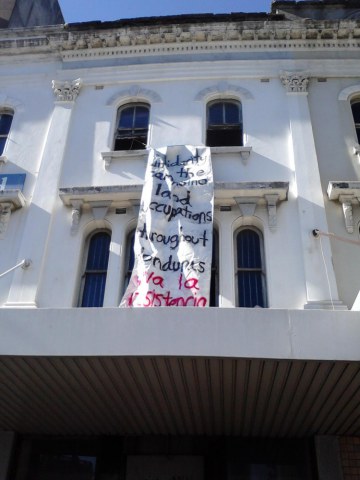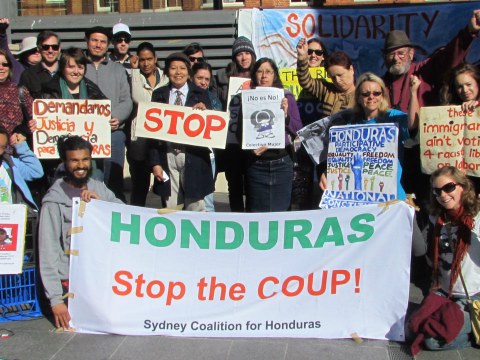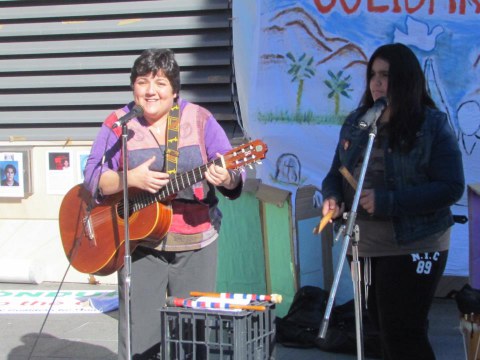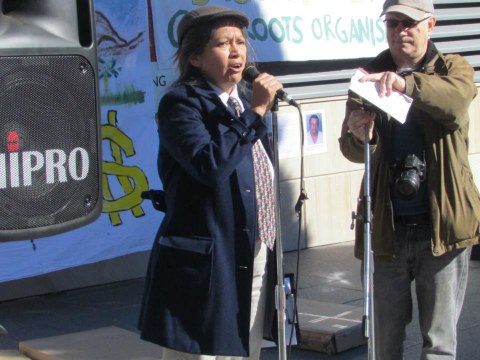On 23 June 2012 on the Iberoamerican Plaza next to Central Station, Sydney, 40 people gathered as a community in solidarity with the people of Honduras against the continued political killings, human rights violations and environmental exploitation that has been driven by an internationally coordinated military coup since 28th June 2009. The coup was to ensure conditions to allow business to do whatever they want without regard for human lives and the environment.
The call out to declare 28 June the International Day of Solidarity with Honduras was made this February when an international human rights convergence was held in Bajo Aguán. The call out was for people around the world to hold protests outside Honduran embassies. There are no Honduran diplomatic bodies in Australia, but that does not stop us from showing our solidarity.
A large banner reading “Solidarity with the campesino land occupations throughout Honduras. viva la resistencia” was dropped from a prominent three storey building near Sydney’s busy Central railway station. The building had been occupied by activists before being evicted one year ago, it remains empty.
Holly from Friends of the Earth Sydney read a message from a representative, of the farmers movement MUCA, which reclaims land, who highlighted that more than 50 farmers have died, to which the movement holds responsible the palm oil giants and large landholders Facussé, Morales and Canales. She made the links between the plan of the Australian government to participate in the carbon trading market, a scheme that starts in 2015, and the global landgrabbing against farmers and Indigenous peoples. She made a call-out to the environmentalist movement to recognise the political and social repression that comes with these global carbon reduction sales, and to be in solidarity with the affected peoples of such trade around the world.
Colectivo Mujer representatives read out poems by a Honduran feminist poet and highlighted the impunity with which femicides are being committed in Honduras, and to paint a picture of the whitewashing being lived by the Honduran people through the military coup.
Sharon from Teachers Federation condemned the human rights violations and expressed solidarity with the resistance and the teachers in struggle in Honduras. TFNSW committed to putting out the words for the message that a compañera of Copemh prepared for the protest.
CFMEU organiser Vriduar Vega reiterated the commitment of CFMEU in solidarity with the Honduran resistance, and condemned political repression and assassinations.
A Street theatre performance ended the protest with a group of friends portraying symbolically what it is like to live under a dictatorship, being forced to wear grey and walk on knees, and the power of collectively organising to overcome this, to have a revolution of colours.
The military coup took place on 28 June 2009, it involved the kidnapping and removal of the social reformist Zelaya government deporting him from the US military base and installing in his place the Micheletti regime. A massive resistance flourished from the same day with existing social organisations and the wider community. Under this military dictatorship an election that the resistance boycotted was held and another illegitimate regime under the name of Lobo was held, a puppet regime that continues to serve business interests passing antiterrorist laws, reducing human and environmental rights and increasing business freedom, e.g. by making ´model cities´ - privatisation of entire cities.
Over the last three years, political killings have taken place almost weekly to the point where most have lost track of the tally, and in the last month the pace of these killings has surged dramatically. San Pedro Sula has now eclipsed Ciudad Juarez as the ‘murder capital’ of the world. We know of 9 political assassinations in May 2012 including a case where three police invaded the family home of a young Indigenous and anti-dams activist Santos Rodríguez, on May Day, shooting and killing him immediately, although most activists have been killed death squad style with complicity from the de-facto authorities. Sectors of the resistance who have suffered massive killings include women, lgbti, teachers, human rights defenders, farmers, indigenous activists, unionists and journalists – more than 20 journalists have been killed since the coup
Apart from killings; death threats, attempts, attacks, teargas, police and military brutality at protests, illegal detentions, judicial persecution, being followed by suspicious persons and vehicles without numberplates, are all part of the reality of diverse individuals and groups engaging in activism to change their conditions. Even some international human rights observers reported death threats against themselves lately.
Environmental activists have been amongst people killed, greenwashing is to the degree that the regime promotes ´sustainable open pit´ mining to the ´international community´. The regime maximised what mining companies can do in Honduras, polluting land, soil and waterways. It also promotes expansion of biofuels including of palm oil, sugar, and corn – a false solution to climate issue that prioritises the use of monocrops and production for export to international markets over and above production for local needs such as food consumption.
It may seem a world away sometimes but we have common grounds. Our cops kill too. They too brutally handle protesters and arrest and abuse and judicially process us. We are up against similar neoliberal forces to favour a system that gives way to those with money, and threads upon those that don´t. We are teachers, Indigenous peoples, we are journalists, we farm, we fight for land rights, we fight for women´s rights, against profiteering in education, for lgbti rights, they do too. We share this earth, we live in a capitalist system, we don´t have participative democracy, some of us want that.
Another side of accompanying the Honduran resistance is the inspiration. For example in the context over where since 2009, 50 land-occupying farmers have been killed in Bajo Aguán region, where a major land struggle is being carried out against palm oil giants, can you imagine that a sudden mass land occupation nationally would be organised for people to further take control of land? It started on International Peasants Day in April in many different provinces, its biggest group MOCSAN has been evicted 3 times (the second time with over 100 arrests) and reoccupied twice so far, from sugar plantations.. It is an inspiration that people deal with whole towns being destroyed, burned down, and would still massively return and reoccupy
5 minutes video of the protest (Spanish) http://www.youtube.com/watch?v=31nkJuyuKns&feature=youtu.be




